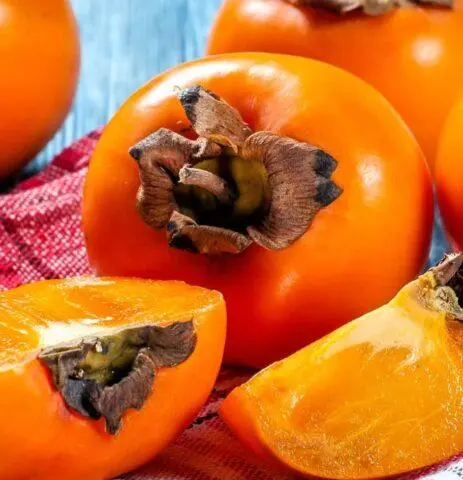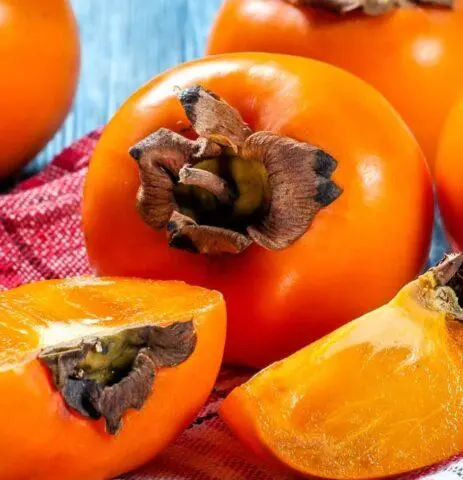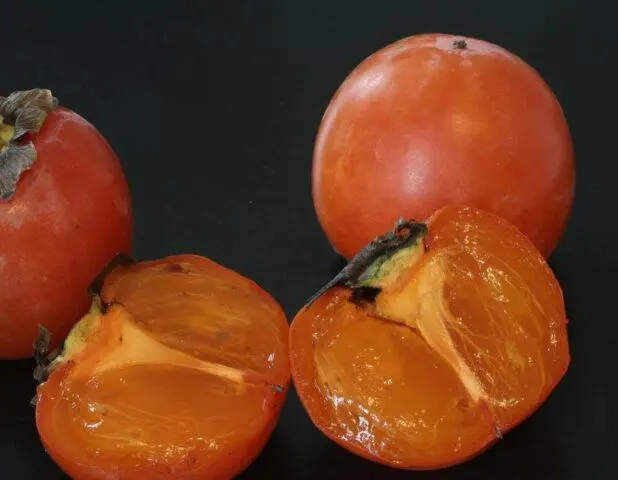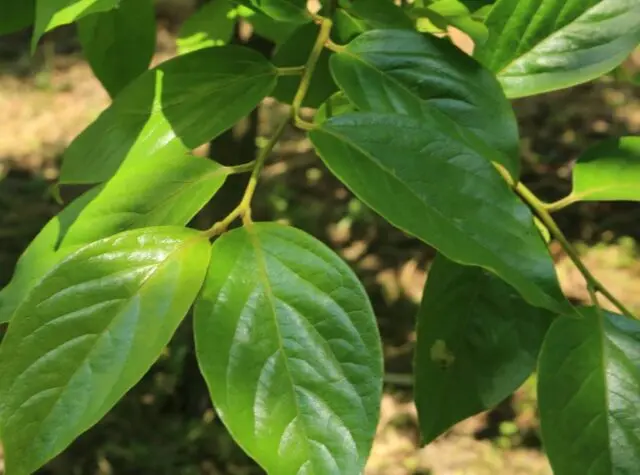Contents
- What vitamins and minerals are found in persimmon
- The benefits of persimmon for the human body
- Is it possible to use persimmon during pregnancy
- Eating persimmon while breastfeeding
- How to eat persimmons
- The use of persimmon in cosmetology
- Medicinal properties of persimmon leaves
- The harm of persimmon to the human body
- Who should not eat persimmons and why
- Conclusion


Persimmon is a seasonal fruit that is valued not only for its bright taste, but also for its rich chemical composition. In the absence of contraindications, nutritionists unequivocally recommend including it in the diet, protecting yourself from autumn and winter vitamin deficiencies. Persimmon is useful for the body of women, men and children, but only if you do not abuse it and do not forget about the features of food compatibility.
What vitamins and minerals are found in persimmon
The undoubted benefits of persimmon for the body are due to the richness of the composition of vitamins and trace elements. Moreover, it contains very rare substances in high concentrations – rubidium, cobalt, lithium, vanadium, molybdenum, chromium, selenium.

Persimmon – a fruit with a pronounced “seasonality”
Of the more common substances that benefit the body, the fruit contains:
- Vitamin C. Strengthens the immune system and protective functions of the body. It is of great benefit in the fight against free radicals, stimulates metabolism.
- Vitamin A. Undoubtedly, the benefits of persimmon to maintain visual acuity, protect the eyes from overwork.
- Vitamin E. A powerful natural antioxidant that neutralizes the negative effects of free radicals.
- Vitamin R. Without it, the liver will not function normally, the walls of blood vessels will become fragile.
- Vitamins of group B. Participate in almost all metabolic processes. Their benefits in the fight against excessively early aging of the body have also been proven.
- Beta carotene. Its presence is evident from the bright yellow or orange color of the skin and flesh. It is a powerful natural antioxidant, its main benefit is the activation of the process of tissue regeneration at the cellular level.
- Magnesium. It has a beneficial effect on the cardiovascular and nervous system, participates in the formation of bone tissue.
- Potassium. Effectively “supports” the heart, blood vessels, nerve cells. Without it, the normal formation of muscles, the supply of organs and tissues with oxygen and other substances is impossible. Also, the use of potassium is to prevent the formation of deposits of sodium salts, which is important for the functioning of the excretory system.
- Calcium. The main “building material” for bones and teeth, is involved in the process of contraction of the heart muscle, blood clotting.
- Iodine. With its deficiency, the normal functioning of the thyroid gland is impossible, which causes a feeling of chronic fatigue. The inclusion of persimmons in the diet will benefit the entire endocrine system.
- Manganese. Involved in the production of most enzymes.
- Fiber and pectin. Their main benefit is in the normalization of the digestive system. Persimmon helps to get rid of constipation, flatulence, bloating, quickly remove toxins from the body.
- Fructose. Natural “sugar” that stimulates brain activity. Undoubtedly, the benefits of fruits for preventing its age-related degeneration, improving memory, the ability to concentrate attention for a long time, and mental “endurance”.
- Phytonutrients. The benefits of these substances contained in the pulp for the body are very “multifaceted”: they control oxidation processes, effectively fight inflammation, and prevent the development of tumors and cell destruction.
- Phytosterols. Natural analogs of synthetic hormones that normalize the functioning of the reproductive system without the side effects inherent in “chemistry”.
- Phenolic compounds. They neutralize free radicals, normalize blood pressure, and help “remove” “bad” cholesterol from the blood. Also, their benefit lies in the prevention of the development of cancer and pathologies of the endocrine system.
- Tannins (tannins). It is a powerful natural “antiseptic” that destroys pathogenic microflora. In addition, they will benefit people prone to allergies by reducing the intensity of symptoms.

Persimmon has a beneficial effect on the overall resistance of the body, its ability to adapt.
The benefits of persimmon for the human body
Persimmon is not only an unusual seasonal exotic and a delicious dessert. In the absence of allergies and other contraindications, it is recommended to include it in the diet for everyone. The fruit will benefit both men, women and children.
The benefits of persimmon for a woman’s body
The list of useful properties of persimmon for a woman’s body includes the following:
- The fruit has a beneficial effect on the nervous system, helps to restore peace of mind. It is also undeniable its benefits in reducing the intensity of the symptoms of menopause.
- Persimmon is not only a powerful natural antioxidant and a storehouse of vitamins, it helps to remove toxins from the body.
- Fruits help prevent anemia and increase the level of hemoglobin in the blood, get rid of edema.

Persimmon helps women to preserve beauty and youth for a long time.
The benefits of persimmon for the body of a man
The fruit will also bring significant benefits to the male body:
- Maintaining the health of the reproductive system. Calcium, magnesium and selenium are very good for the prostate gland.
- Beneficial effect on the nervous system. It has been scientifically proven that men tolerate chronic stress worse than women.
- Strengthening the heart and blood vessels. Heart attacks, strokes, and other cardiovascular diseases are more common in men.

With regular intense physical exertion, men are strongly recommended to include persimmons in their diet.
What is useful persimmon for children
Fruit is included in the diet for children, as it has a beneficial effect on almost all organs and systems. We must not forget that its season falls on autumn and winter, when it is especially important to strengthen the immune system.

A fruit that rarely causes allergies becomes a valuable source of vitamins, macro- and microelements, including very rare ones, for a child.
The benefits of persimmon for women after 50 years
Persimmon is very rich in natural antioxidants. Their main benefit for women over 50 is to neutralize the effects of free radicals, which can slow down aging. In addition, the inclusion of fruit in the diet allows you to relatively “painlessly” survive the hormonal “restructuring” associated with menopause and the onset of menopause.
Is it possible to use persimmon during pregnancy
The benefits of persimmon for the body of a pregnant woman are undeniable, but harm to health is possible in certain cases. It provides the fetus with the substances necessary for its normal development and increases the mother’s resistance to colds, viral and other diseases that are potentially dangerous for the child. Also, the fruit is an effective prevention of the development of anemia, varicose veins and edema, helps to “smooth out” some manifestations of toxicosis, having a beneficial effect on the nervous system.
But at the same time, due to the high concentration of fructose, there is a risk of gaining even more extra pounds. And the tendency to constipation, especially clearly manifested in the third semester, may worsen.

For maximum benefit, pregnant women are advised to eat persimmons without peel.
Eating persimmon while breastfeeding
Fruit can be included in the diet 3-4 months after childbirth. If it did not cause allergies in a child, then it will be very useful for the mother due to the high nutritional value and richness of the chemical composition. Persimmon helps the body to “get in shape” faster – normalize the psycho-emotional state and hormonal levels, restore physical strength.
How to eat persimmons
Persimmon, rich in fiber and pectin, according to nutritionists, would be right to eat about half an hour earlier or an hour later than the main meal. If the meal was “heavy”, the intervals increase to 2-2,5 hours.
Tart unripe fruits will not bring the body almost any benefit. Conversely, high concentrations of tannins can cause digestive problems.
Most often, the fruit is included in the diet fresh. Even a short heat treatment inevitably destroys vitamins, macro- and microelements, reducing the concentration of substances necessary for the body. However, it can be used for:
- homemade preparations (jam, jam, marmalade);
- production of homemade wines, ciders;
- toppings for baking;
- preparation of the main course;
- drying.

Only ripe persimmons are suitable for food.
How many persimmons can you eat per day
An approximate “daily dose” for an adult, when it still benefits the body, is 3-4 fruits daily. For a child from three years old, the rate is halved. Women who are breastfeeding include persimmons in the diet in minimal amounts (1/3-1/2 fruit per day).
The use of persimmon in cosmetology
In home cosmetology, fruit pulp is a sought-after ingredient in face masks. They provide:
- deep hydration and nutrition of cells, including those in the deep layers of the dermis;
- stimulation of the synthesis of collagen and elastin;
- smoothing fine wrinkles;
- restoration of a healthy even complexion;
- elimination of inflammation, redness, greasy shine, and other problems typical of oily skin;
- the disappearance of irritations and peeling typical of dry and sensitive skin.
Depending on the desired effect, the pulp crushed into a homogeneous puree is mixed with:
- beaten egg, for very dry or oily skin – only with yolk or protein;
- any homemade dairy products – cream, sour cream, kefir, cottage cheese;
- potato or corn starch, oatmeal, pharmacy powdered clay;
- natural oils used in cosmetology – olive, almond, grape or peach kernels;
- aloe juice, cucumber or rice flour.

Persimmon will benefit not only when eaten, but also when applied externally
Medicinal properties of persimmon leaves
In Asian folk medicine, it has long been known that not only fruits, but also bark, seeds, persimmon leaves bring health benefits. Their latter are prepared in decoctions, teas or infusions and are used for:
- relief of inflammatory processes caused by infections in the oral cavity;
- fight against diarrhea, other disorders of the stomach and intestines;
- stimulation of the kidneys;
- stop bleeding;
- rapid restoration of the general tone of the body;
- prevention of anemia and beriberi, the fight against them;
- normalization of blood pressure and blood composition;
- destruction of pathogenic microflora in the intestine;
- restoring healthy sleep and mental balance.

In folk medicine, both fresh and dried leaves are in demand.
The harm of persimmon to the human body
If you do not take into account contraindications, persimmon can bring not only benefits to the body, but also harm. Since the fruits are rich in tannins and fiber, in people who are overly addicted to them or combine them with seafood, vegetable fibers “knock” into undigested “lumps” (so-called “bezoar stones”), which gradually increase in size and can lead to obstruction of the stomach or intestines. The risk is especially great for women over 40 years old – when the production of estrogen and other sex hormones decreases, the synthesis of digestive enzymes also suffers.
Persimmon is rich in iodine, and this is its undoubted benefit. However, when fruit is abused in combination with self-medication containing the same trace element, its overdose occurs in the body, which leads to chronic inflammation and hyperfunction of the thyroid gland.
It is also possible to “oversaturate” the body with vitamin A. Then it does not provide benefits for vision, but nausea, vomiting, in especially severe cases – convulsions, discoloration of the skin and mucous membranes of the eyes.

Despite the seeming “harmlessness”, it is impossible to abuse persimmon
Who should not eat persimmons and why
Allergy to persimmon is a very rare, but not unbelievable phenomenon. For people with individual intolerance, the fruit will not bring any benefit. There are other diseases in which you can not eat persimmons:
- Gastritis, ulcers, other chronic diseases of the stomach and intestines. The tannins contained in the persimmon, in combination with fruit acids, irritate the mucous membranes. Instead of health benefits, it can provide an acute onset of illness.
- Age up to three years. The digestive system of young children does not produce gastric juice in the volume necessary for the “processing” of the fiber contained in persimmons.
- Chronic kidney disease in the acute stage. Persimmon works as a diuretic, the load on them increases.
- Tendency to constipation, reduced intestinal motility. Here, mainly unripe fruits are dangerous, which negatively affect the functioning of the digestive system.
- Chronic hypotension. Persimmon also lowers blood pressure.

If a small child eats a persimmon, bloating, pain, abdominal cramps, and other discomfort are very likely.
Conclusion
Persimmon is useful for the body of women, men and children – it is just a storehouse of vitamins, macro-, microelements and other necessary substances. The rich chemical composition is successfully “complemented” with a sweet delicate taste, so the seasonal fruit is readily included in the diet. But, despite all the undeniable benefits, its use will have to be abandoned if there are contraindications and individual intolerance.









